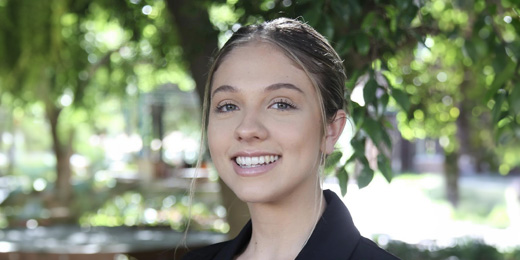Course overview
Set the bar high and become a legal practitioner.
Our Bachelor of Laws will give you the expertise to provide legal advice and undertake legal work. Throughout the course, you'll develop a strong commercial understanding and learn the skills, ethics and responsibilities of legal practice.
An undergraduate degree in law is the first qualification you need on the path to becoming a lawyer in Australia. This course is ideal if you aspire to become a legal practitioner who utilises analysis, logic and persuasion skills to help people and organisations.
Career outcomes
Jobs for legal professionals in Australia are expected to grow by 22% by 2034 – well above the 14% average growth projected for all occupations.¹
Careers
- Solicitor in commercial or specialist area, eg: employment law, family law, criminal law etc.
- Government lawyer
- Corporate 'in-house' lawyer
- Community Legal Service lawyer
- Human rights lawyer
- Barrister
Industries
- Law
- Private legal practice
- Government
- Courts and tribunals
- Business, banking and finance
- Science, technology and innovation
- Media
¹ jobsandskills.gov.au (November 2025).
Professional accreditation and recognition
Curtin Law School offers you a complete pathway to legal practice. After gaining your Bachelor of Laws, you can complete the Graduate Diploma in Legal Practice (also known as Practical Legal Training, or PLT). Together, the two qualifications meet the academic and PLT requirements to qualify for admission to the legal profession in Western Australia.
Why study at Curtin?
Get the Curtin edge
Curtin Law School is in the heart of Perth city and co-located with a barrister's chambers.
Accelerated learning
Our teaching staff include active legal practitioners, and you can practise legal presentations and debating at our purpose-designed Jeanette Hacket Moot Court.
Work experience
At the John Curtin Law Clinic, you can prepare advice for real clients under the supervision of experienced legal practitioners.
Hear from our students

"I knew I wanted to pursue a challenging and satisfying career that prioritised my value of community and allowed me to engage in meaningful work. Studying at Law at Curtin is a diverse and exciting experience. I participated in simulated work in the legal profession right from my very first year and completed both the John Curtin Legal Clinic and Legal Internship unit. These gave me direct access to experiences that illustrate what it is like to work as a lawyer across various professions, all with the support of legal professionals."
Tasmin Cillier
Bachelor of Laws and Bachelor of Commerce (Accounting) double degree
Your student experience

Work-integrated learning at Curtin: explore a Universe of opportunity
Develop real-world experience before you graduate. Learn how work-integrated learning helps you build career skills and connect with industry early.

Thinking about uni? Five reasons Curtin could be your best move
Not sure if uni is for you? Explore five clear reasons students choose Curtin – from flexible pathways and support to real-world skills and outcomes.

Find your entry pathway to Curtin
You may be finishing high school, coming from TAFE, or just thinking of a career change; but whatever your background, there’s an entry pathway to Curtin for you.
Other study options
Elevate your skillset by choosing a double degree and studying our postgraduate Practical Legal Training program.
Double degrees
We offer a range of double degrees with our Bachelor of Laws:
Practical Legal Training Graduate Diploma
Our Practical Legal Training (PLT) course is a graduate diploma designed for graduates who have completed a Bachelor of Laws or Juris Doctor course at an Australian university and intend to apply for admission to the legal profession in Western Australia.
Approved by the Legal Practice Board of Western Australia, this is the first specialised PLT program to be delivered by a WA university.
Upcoming events

29 March 2026
Curtin Open Day
Curtin Perth
Discover where in the world a Curtin Degree can take you at Curtin Open Day. Explore courses that connect with industry, meet people who can guide your career direction and see how your ideas can become a reality.
Course structure
What you’ll learn
In this course, you will learn core skills essential to effective legal practice and build a strong commercial awareness.
Following your first year of study – which comprises two semesters at Curtin Perth – you'll complete your second and third years in trimesters at Curtin Law School, in the heart of Perth’s legal precinct. This is an accelerated format that is equivalent to a four-year law degree but enables Curtin Law students to complete their degree in three years.
Practical learning
Curtin's Bachelor of Laws provides three ways for you to gain practical legal experience: through our high-tech moot court, John Curtin Law Clinic, and Legal Internships Program.
- At the Jeanette Hacket Moot Court, you'll participate in simulated court proceedings, and develop skills in legal argument and debate.
- The John Curtin Law Clinic will give you real-world experience providing legal advice, under the guidance of legal practitioners.
- In the Legal Internships Program, you'll work with a professional legal team or a barrister, in a legal environment such as law firm, court or community legal centre.
In addition, you may have opportunities for internships with Curtin Law School's partner organisations.
These immersive experiences will not only build your legal skills, but also help you identify the area in which you’d like to practise.
Optional units
Our Law degree also enables you to study optional units, to tailor your degree to your career interests. They include areas such as human rights law, forensic advocacy, employment law, environmental law and policy, law and technology, and native title law and policy.
Detailed course structure and unit information
For detailed information and course structure, visit our Handbook.
Entry requirements
To study this course, you must meet the entry criteria:
- course ATAR, or equivalent, demonstrated via an accepted entry pathway
- any course-specific requirements
- English language requirement.
Guaranteed entry
If you achieve the guaranteed ATAR/selection rank for this course and meet all other entry requirements, you’re guaranteed a place in this course.
Entry pathways
There are different ways to meet our academic entry requirements. Choose the option that best suits the highest level of education that you’ve achieved.
Curious how students entered this course? See the entry pathways other students have taken.
Course-specific requirements
You’ll also need to meet any specific requirements to be eligible to apply for this course.
Study credit and support
You may be able to receive study credit or support based on your previous experience or personal circumstances.
Get credit towards your degree
You may be able to receive credit for recognised learning (CRL) from past study or professional experience, which could reduce the time it takes to finish your course.
Find specific details about CRL for this course on the Handbook.
Special consideration
If your studies were affected by circumstances beyond your control, you may be eligible for special consideration when applying to Curtin. This process is available to new applicants only and allows your application to be assessed in light of those circumstances.
Additional information
Notes about this course
Make sure you check the course notes for any other important information.
Fees
2026 Domestic indicative fees
*The indicative first-year fee is based on a standard full-time study load of 200 credit points.
This fee is a guide only. Your total fee may vary depending on the units you choose, your study load or if your course includes additional requirements. For more information on fees, see other fees and charges.
Scholarships
Get the support you need to succeed with our diverse range of scholarships. Whether it’s financial support, assistance with relocation, or recognition for your academic achievements, we have scholarships tailored to your unique needs.
How to apply
Follow these steps to make sure you’re eligible, prepared and ready to apply for your course.
Check entry requirements
Entry requirements differ by course and your previous work and study experience.
Prepare your documents
The documents you need may vary depending on your course and application pathway.
Check application deadlines
Deadlines vary by course and whether you’re applying as a domestic or international student.
Choose your application pathway
I’m in year 12 or applying for Medicine
If you’re in year 12 or recently finished high school, you’ll need to apply through TISC.
You’ll apply through TISC no matter what you studied in high school, whether that was:
- ATAR
- General subjects
- Certificate IV
- or completing UniReady in Schools program.
TISC has different application dates to Curtin. Visit the TISC website for all important dates, including application deadlines.
I have finished high school
If you’re not a current year 12 student or recent graduate, you’re considered a non school leaver and you’ll apply directly to Curtin.
The only exception is Medicine, which must be applied for through TISC.
You’ll apply directly to Curtin if you are:
- a high school graduate who finished school last year or earlier
- transferring from another university
- returning to study or using your professional experience to qualify
- progressing from a VET or TAFE qualification or bridging program
- a current Curtin student changing courses or campuses.
Application deadlines can vary by course. Make sure to check application deadlines before you apply.
Express your interestExplore more
Find more resources to help you take the next step in your Curtin journey.